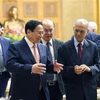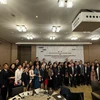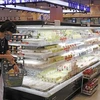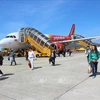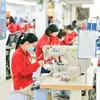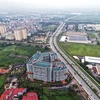The framework of a cooperation programme between Vietnam and the Food and Agriculture Organisation (FAO) of the United Nations in the 2012-2016 period was released in Hanoi on October 14.
The framework defines the support of the FAO system in Vietnam over the next five years, in order to meet the nation’s priorities given in the 2011-2020 socio-economic development strategy and the 2011-2015 socio-economic development plan.
The FAO will continue to help Vietnam effectively use technical and financial assistance, contributing to ensuring food security and nutrition, developing agro-forestry-aquatic production, and raising the standard of living for people in rural areas.
Deputy Minister of Agriculture and Rural Development Nguyen Thi Xuan Thu acknowledged the support of the FAO and other international organisations and sponsors. She said Vietnam wants to continue receiving both financial and technical assistance from the global community to help the country successfully implement the restructuring programme of the agriculture sector and the national target programme on agriculture, farmers and rural areas, develop a green agriculture, and increase the added value and competitiveness of products.
She also stressed the importance of agriculture to Vietnam in ensuring food security, which she said, has contributed to reducing poverty, ensuring social welfare and creating conditions for national industrialisation and modernisation.
FAO Chief Representative Jong Ha Bae noted that it is necessary for Vietnam to restructure its agricultural sector with a focus on increasing the productivity and quality of products as well as strengthening mechanisation and the added value chain, as the country is facing many challenges, including an unstable macro-economy, inflation and a high trade deficit.
Over the next five years, the cooperation programme will focus on supporting Vietnam build a legal framework and policies on livelihood, nutrition and food security, to and reduce the negative impacts of climate change and the greenhouse effect.
Priority will be given to improving the supply of goods and agro-fishery and aquaculture services in a sustainable manner, increasing the quality of products and helping the most vulnerable people in rural areas participate in the agricultural and food system effectively.-VNA
The framework defines the support of the FAO system in Vietnam over the next five years, in order to meet the nation’s priorities given in the 2011-2020 socio-economic development strategy and the 2011-2015 socio-economic development plan.
The FAO will continue to help Vietnam effectively use technical and financial assistance, contributing to ensuring food security and nutrition, developing agro-forestry-aquatic production, and raising the standard of living for people in rural areas.
Deputy Minister of Agriculture and Rural Development Nguyen Thi Xuan Thu acknowledged the support of the FAO and other international organisations and sponsors. She said Vietnam wants to continue receiving both financial and technical assistance from the global community to help the country successfully implement the restructuring programme of the agriculture sector and the national target programme on agriculture, farmers and rural areas, develop a green agriculture, and increase the added value and competitiveness of products.
She also stressed the importance of agriculture to Vietnam in ensuring food security, which she said, has contributed to reducing poverty, ensuring social welfare and creating conditions for national industrialisation and modernisation.
FAO Chief Representative Jong Ha Bae noted that it is necessary for Vietnam to restructure its agricultural sector with a focus on increasing the productivity and quality of products as well as strengthening mechanisation and the added value chain, as the country is facing many challenges, including an unstable macro-economy, inflation and a high trade deficit.
Over the next five years, the cooperation programme will focus on supporting Vietnam build a legal framework and policies on livelihood, nutrition and food security, to and reduce the negative impacts of climate change and the greenhouse effect.
Priority will be given to improving the supply of goods and agro-fishery and aquaculture services in a sustainable manner, increasing the quality of products and helping the most vulnerable people in rural areas participate in the agricultural and food system effectively.-VNA
